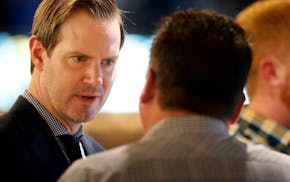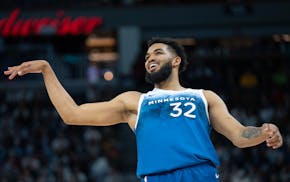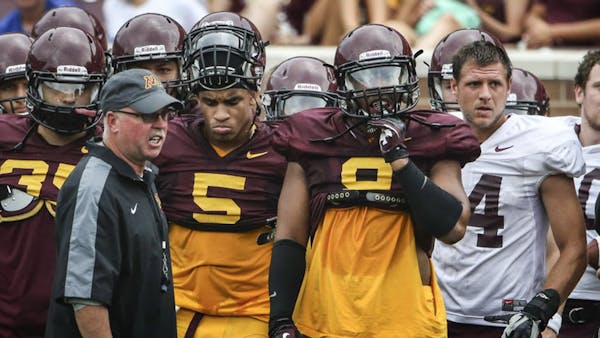The decline of Gophers football can be traced to Sept. 20, 1969. The season opener was played on that Saturday night at Arizona State, then a member of the Western Athletic Conference.
The Gophers moved the ball persistently behind the power running of fullback Jim Carter, yet were helpless to stop a passing attack led by ASU's Joe Spagnola and lost 48-26.
The traditional strengths of Murray Warmath's teams — running the ball on offense and stopping the run on defense — were not the answer for success after that.
There were seven coaches in the four decades following Warmath: Cal Stoll (1972-78), Joe Salem (1979-83), Lou Holtz (1984-85), John Gutekunst (1986-91), Jim Wacker (1992-96), Glen Mason (1997-2006) and Tim Brewster (2007-10).
Mason stayed the longest and had the closest brush with success, yet in the end he was done in by the same failure that caused the others to not make it here: incompetent defense.
Holtz? Yes, we would have loved it if Lou had stuck around, but he also was 10-12 in two seasons and his final two games were losses to Michigan and Iowa by a combined 79-16.
What was interesting about Mason's decade was that after his first couple of years this was what we were saying: "The big difference between Mason and previous coaches is that Mason's teams play defense.''
Mason and his defensive coordinator, David Gibbs, took the Gophers from 63rd in the nation (368.3 yards allowed per game) in team defense in their first season of 1997, to 22nd in the nation (313.4 yards) in the turnaround season of 1999.
The Gophers were 56th in team defense in 2000, tumbled to 90th in the losing season of 2001, then were 48th in 2002 and 34th in 2003.
They fell back to 75th, allowing 396.7 yards per game, in 2004. Mason ran off Greg Hudson as defensive coordinator and replaced him with David Lockwood.
The folklore is that university President Robert Bruininks and athletic director Joel Maturi decided on a flight home from the 2006 Insight Bowl to fire Mason. They were disgusted by the Gophers blowing a 35-7 lead and losing 44-41 in overtime to Texas Tech — and said to be turned off by Mason's grousing during the stay in Phoenix.
That's right. Mason's Waterloo came in the same location, Sun Devil Stadium, where Murray Warmath's had started 38 seasons earlier.
Maybe the decision to fire Mason was less impulsive and more studied than suspected. Maybe Maturi took a hard look at the defensive statistics, where the Gophers had fallen to 90th in the nation (412.7 yards per game) in 2005 and to 112th (416 yards per game) in 2006.
The next season was Brew- ster's first. To confirm how bad the defensive manpower had gotten, the Gophers were 119th (dead last in Division I-A) in team defense at 519 yards per game in 2007.
Why did Mason's teams stop playing defense? Players, obviously.
The Gophers had defenders such as linemen Greg White, Karon Riley and Darrell Reid, and backs such as Tyrone Carter, Willie Middlebrooks, Eli Ward and Mike Lehan, when success was within reach for Mason.
By the end, they didn't have defenders who could have reached a quarterback or a receiver if it was flag football.
Jerry Kill's fourth season starts tonight against pushover Eastern Illinois, and there is hope this finally can be the head coach to turn defense into an asset rather than this program's mark of futility.
Certainly since Salem, the Gophers' most persistent vacuums have been in the defensive line and in the secondary. If you can't pressure a quarterback, or press a receiver in coverage, you're dead in big-time football — and most often, the Gophers have not had the players to do either.
The Gophers have been 60th, 38th and 49th in team defense nationally in Kill's first three seasons, but the signs of better days are there.
Tackle Ra'Shede Hageman and safety Brock Vereen went from the 2013 Gophers to the NFL as draft choices. This year, Theiren Cockran will lead the pass rush. And there are talented corners — Eric Murray and Derrick Wells — who can cover (amazing, but true).
The Gophers' tradition of offering changes in coordinators as the solution for defensive failings also is over. Mason had four defensive coordinators in his decade, and poor Brewster had three in his 3 ½ seasons.
Jerry Kill has the trusted Tracy Claeys. Period.
Patrick Reusse can be heard 3-6 weekdays on AM-1500.

Reusse: Success on court helped Timberwolves do strong business

Reusse: Taylor's story. 'I just bought the Minnesota Timberwolves.'

Reusse: Back from injury, Towns doesn't have to carry load


